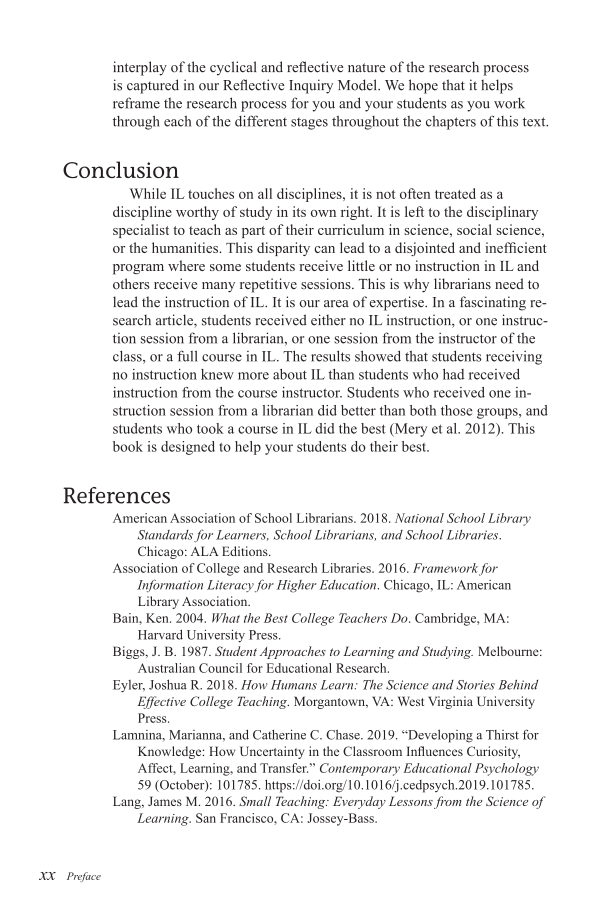xx Preface interplay of the cyclical and reflective nature of the research process is captured in our Reflective Inquiry Model. We hope that it helps reframe the research process for you and your students as you work through each of the different stages throughout the chapters of this text. Conclusion While IL touches on all disciplines, it is not often treated as a discipline worthy of study in its own right. It is left to the disciplinary specialist to teach as part of their curriculum in science, social science, or the humanities. This disparity can lead to a disjointed and inefficient program where some students receive little or no instruction in IL and others receive many repetitive sessions. This is why librarians need to lead the instruction of IL. It is our area of expertise. In a fascinating re- search article, students received either no IL instruction, or one instruc- tion session from a librarian, or one session from the instructor of the class, or a full course in IL. The results showed that students receiving no instruction knew more about IL than students who had received instruction from the course instructor. Students who received one in- struction session from a librarian did better than both those groups, and students who took a course in IL did the best (Mery et al. 2012). This book is designed to help your students do their best. References American Association of School Librarians. 2018. National School Library Standards for Learners, School Librarians, and School Libraries. Chicago: ALA Editions. Association of College and Research Libraries. 2016. Framework for Information Literacy for Higher Education. Chicago, IL: American Library Association. Bain, Ken. 2004. What the Best College Teachers Do. Cambridge, MA: Harvard University Press. Biggs, J. B. 1987. Student Approaches to Learning and Studying. Melbourne: Australian Council for Educational Research. Eyler, Joshua R. 2018. How Humans Learn: The Science and Stories Behind Effective College Teaching. Morgantown, VA: West Virginia University Press. Lamnina, Marianna, and Catherine C. Chase. 2019. “Developing a Thirst for Knowledge: How Uncertainty in the Classroom Influences Curiosity, Affect, Learning, and Transfer.” Contemporary Educational Psychology 59 (October): 101785. https://doi.org/10.1016/j.cedpsych.2019.101785. Lang, James M. 2016. Small Teaching: Everyday Lessons from the Science of Learning. San Francisco, CA: Jossey-Bass.
Document Details My Account Print multiple pages
Print
You have printed 0 times in the last 24 hours.
Your print count will reset on at .
You may print 0 more time(s) before then.
You may print a maximum of 0 pages at a time.





























































































































































































































